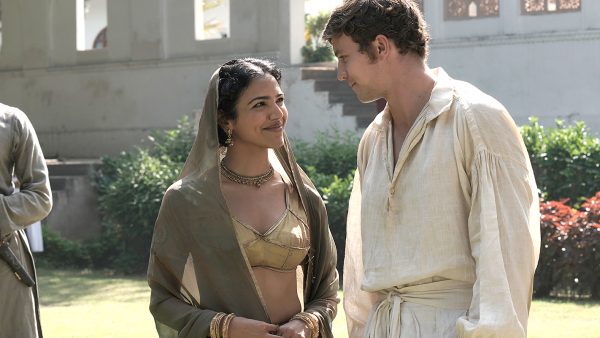Television Review: “Beecham House” — A Steamy Passage to India
By Sarah Osman
As a potentially thoughtful drama (hey, this is PBS) set during a revolutionary and colonialist era, Beecham House falls as flat as papadum.

A scene from PBS’S historical soap, Beecham House.
PBS’s latest addition to its Masterpiece Theater franchise is Beecham House, a flashy melodrama set in late 18th-century India. The series follows the profitable footsteps of the ever popular Downton Abbey. There’s a proper, oft-scandalized older English dame (although her zingers aren’t nearly as good as Maggie Smith’s), a strapping young gentleman surrounded by goo-goo-eyed women, plenty of overheated interludes among unruly servants, and inexplicable plotlines. The result is that, as a soap, Beecham House is great fun. As a potentially thoughtful drama (hey, this is PBS) set during a revolutionary and colonialist era, it falls as flat as papadum.
Whether or not Beecham House is historically accurate (or supposed to be) is hard to say. There are characters based on real life figures (like the Emperor), but its protagonists are fictional. We follow John Beecham (Tom Bateman), a former East India Company man with an enigmatic past who is trying to set himself up as a trader in Delhi. He’s perpetually dressed like Indiana Jones and exudes the hunky swagger of a Harrison Ford. He’s the hero we root for against the evil French Commander (Gregory Fitoussi). We, and the other characters in the show, are left amusingly flummoxed — how can Beecham afford to live in an Indian palace, complete with servants? The guy doesn’t even have a trading license. As The Good Guy, Beecham is mighty fine to look at, but he’s rather bland. He insists (a bit too often) that everything he is doing is for the Indian people. He is unfailingly polite and never seems to make a misstep, except for the fact that he has a baby whose maternity is a mystery.
The characters vying for Beecham’s attention are far more interesting than the man himself. His mother (Lesley Nicol) arrives with her traveling companion, Violet (Bessie Carter), who tries to scheme her way into Beecham’s heart. Violet’s desperation to hook the big fish is entertaining, but she is just a romance novel trope. Beecham’s other paramour is Ms. Osbourne (Dakota Blue Richards), the beautiful English governess who works next door.
Meanwhile, the servants (unsurprisingly) have lots of problems of their own. Chanchal (Shriya Pilgaonkar), one of the caretakers of Beecham’s son, falls for Daniel (Leo Sutter), Beecham’s slutty brother, who is anything but a gentleman. This risque relationship scandalizes the servants, who can’t believe such hoochie behavior is taking place under their roof.
Yes, there is plenty of hokum. But between the vibrant costumes and gorgeous sets, Beecham House is beautiful to watch. To the point that it made me (and maybe you) want to hop on a plane (once COVID ends) and explore the eye-filling splendor of India. Still, in terms of writing and direction, the series isn’t all that different from other potted period dramas. PBS wants you to think otherwise. Director Gurinder Chadha, who also directed Bend It like Beckham and Bride and Prejudice, describes Beecham House as “flipping radical.” What’s so radical? Your standard bed-hopping, heavy-breathing antics (with the upper classes raising their eyebrows in disdain and envy) take place in a period piece set in India, which isn’t the most common locale for historical dramas. That is about it in terms of challenging fans of cozy tony soaps. Beecham House isn’t all that different from Downton Abbey or Poldark — it just happens to be Indian. What exactly did the British do to India? Were these gentlemen and ladies beloved? Issues like that are left murky; they are even more inscrutable than Beecham’s secretive background. British colonialism? Nobody here has heard of it.
But it may be unfair to expect this show to be all that interested in examining the turbulent history of India. If watching elephants roam around, men swagger about, and deep-seated scheming is your jam, then Beecham House is undoubtedly for you.
Sarah Mina Osman is a writer living in Los Angeles. She has written for Young Hollywood and High Voltage Magazine. She will be featured in the upcoming anthology Fury: Women’s Lived Experiences under the Trump Era.

This review is on target except for a couple of items. First, John Beecham makes quite a few bad decisions or is blind. Hopefully, that is not giving up too much information or spoilers. I wish the show had gone into more detail about the Indian characters, like Baadal and Chandrika. The show is definitely entertaining but like a soap opera.
entertaining? lol it is an propaganda fake show against indians made by the sikh women chaddha to please the white man.
Absolutely Brilliant!